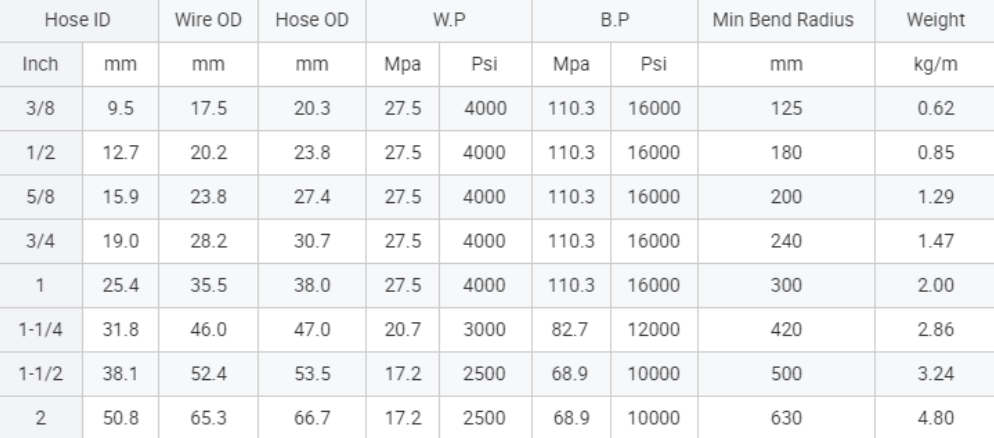335345435
Oct . 17, 2024 20:30 Back to list
Choosing the Right Hydraulic Hose for Industrial Applications and Performance
Industrial Hydraulic Hose Essential Components for Fluid Power Systems
In the realm of industrial machinery and equipment, hydraulic systems play a pivotal role in the operation of a wide array of applications. At the heart of these systems lies an essential component the industrial hydraulic hose. This article delves into the significance of hydraulic hoses, their construction, applications, and maintenance practices to ensure optimal performance.
Understanding Hydraulic Hoses
Hydraulic hoses are specially designed to transport hydraulic fluid between components in a hydraulic system, enabling the transfer of power and motion. These hoses are capable of handling high pressure and are typically made from synthetic rubber, thermoplastics, or a combination of materials. The construction of hydraulic hoses often includes multiple layers an inner tube that resists the flow of hydraulic fluids, a reinforcement layer (which can be made from steel or synthetic fibers) that provides strength and durability, and an outer cover that protects the hose from external environmental factors such as abrasion, chemicals, and temperature extremes.
Types of Hydraulic Hoses
There are several different types of hydraulic hoses available, each tailored for specific applications. Some common classifications include
1. Standard Hydraulic Hoses These are designed for general-purpose use in various industries and can handle moderate to high-pressure applications.
3. Thermoplastic Hoses Lightweight and flexible, thermoplastic hoses are often used in mobile equipment and applications where ease of maneuverability is crucial.
4. Wire-Braided Hoses These hoses have a reinforcement of steel wire braids, making them robust enough for severe conditions. They are commonly used in construction and agricultural equipment.
5. Rubber Hoses Known for their flexibility and durability, rubber hoses are ideal for applications requiring a high degree of bendability.
Applications of Hydraulic Hoses
industrial hydraulic hose

Hydraulic hoses find their use across diverse sectors, including
- Construction Heavy machinery such as excavators, bulldozers, and cranes rely on hydraulic hoses to power their various functions. - Agriculture Tractors and other farming equipment utilize hydraulic systems for tasks such as lifting, steering, and plowing. - Manufacturing In factories, hydraulic hoses are essential for operating presses, conveyors, and other automation equipment. - Transportation Hydraulic systems in vehicles, particularly those requiring braking and steering functions, depend on the integrity of hydraulic hoses.
Importance of Maintenance
Given their critical role, ensuring the reliability and integrity of hydraulic hoses is paramount. Regular maintenance can help to identify potential issues before they lead to failure. Here are some maintenance best practices
1. Visual Inspections Regularly inspect hoses for signs of wear, such as cracks, bulges, or abrasions. Pay special attention to the connections and fittings, as these areas are prone to leaks.
2. Pressure Testing Conduct pressure tests to ensure hoses can withstand operational pressures without failure.
3. Proper Storage Avoid kinking or over-bending hoses during storage to maintain their shape and flexibility.
4. Cleanliness Keep hoses and fittings free from dirt and debris, as contamination can adversely affect hydraulic fluid and lead to system failures.
5. Timely Replacement Follow manufacturer guidelines for replacing hoses. If a hose has reached its service life or shows signs of significant wear, it should be replaced promptly to prevent leaks and system failure.
Conclusion
Industrial hydraulic hoses are integral to the functionality of hydraulic systems across a variety of applications. Understanding their construction, types, and maintenance requirements is essential for maximizing performance and ensuring the longevity of hydraulic equipment. A proactive approach to hose management not only enhances operational efficiency but also ensures safety in diverse industrial environments. By investing time and resources into the care of hydraulic hoses, industries can mitigate risks and maintain seamless operations.
-
SAE 100 R17 Black Smooth Cover Hydraulic Hose
NewsMar.07,2025
-
SAE 100 R17 Black Smooth Cover Hydraulic Hose
NewsMar.07,2025
-
SAE 100 R17 Black Smooth Cover Hydraulic Hose
NewsMar.07,2025
-
SAE 100 R17 Black Smooth Cover Hydraulic Hose
NewsMar.07,2025
-
SAE 100 R17 Black Smooth Cover Hydraulic Hose
NewsMar.07,2025
-
steel wire braided hydraulic hose
NewsMar.07,2025



